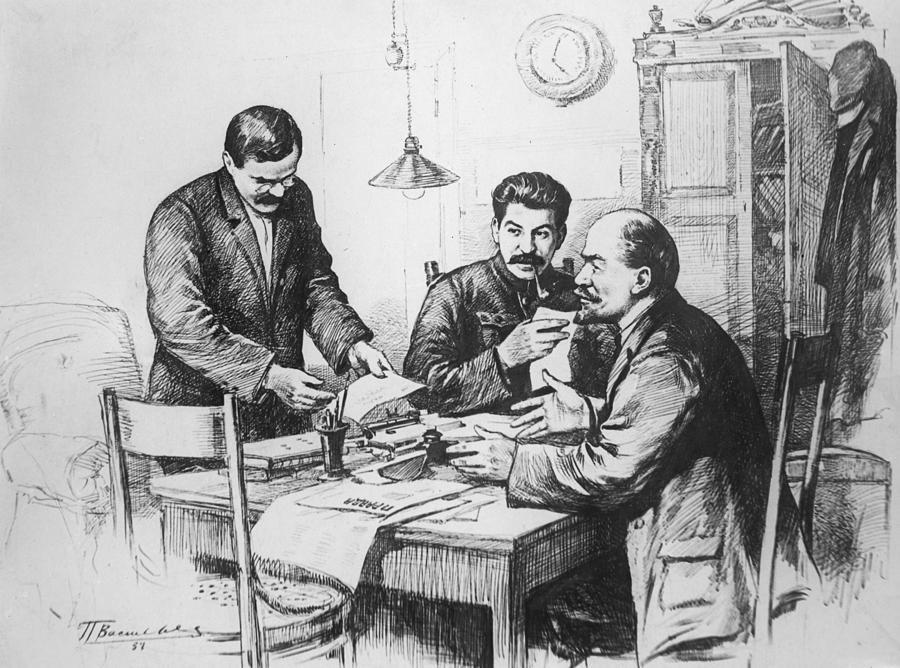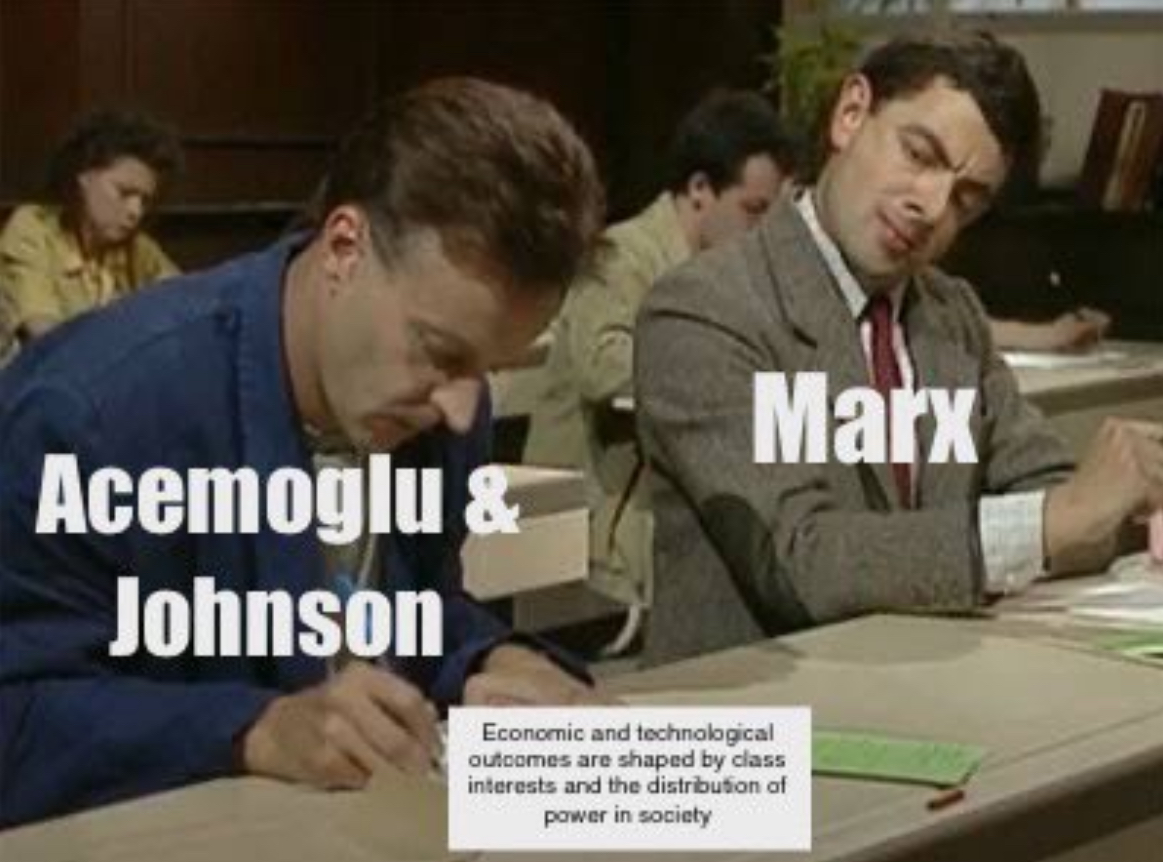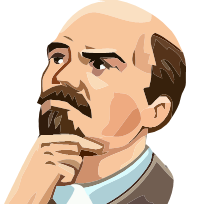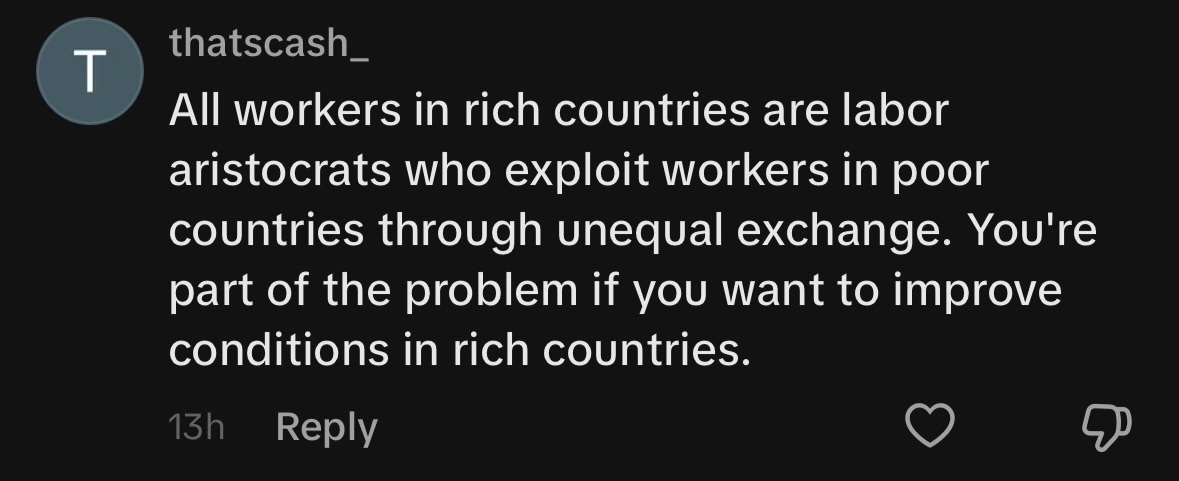Why did Marx believe in Communism?
Marx had argued that capitalism is initially founded on private labor and private appropriation. In other words, capitalism is founded on small enterprise. People labor within their own businesses (private labor), and they then appropriate the wealth of their own business for themselves (private appropriation).
Over time, Marx argued that capitalism has a natural tendency for the scale of enterprises to grow. This leads to small enterprises to be replaced by big enterprises, or, in other words, private labor being replaced by socialized labor. Dozens, hundreds, even hundreds of thousands of workers cease to work in isolation and begin working co-operatively in larger and larger enterprises.
Despite private labor being gradually replaced with socialized labor, appropriation of the fruits of that labor remains private. A bigger and bigger part of the population labors collectively, but a portion of the population separated from them, that is continually growing smaller and smaller, decides what is done with all the wealth they produced.
Marx saw this as a societal contradiction, and only sustainable when it’s not at a very large scale. If society becomes too “polarized,” if the contradiction between socialized labor and private appropriation grows too large, then it would no longer be sustainable, there would be a break, and the only way to resolve it would be to replace private appropriation with socialized appropriation, in other words, to nationalize enterprises so that the collective laborers also control what is done with the fruits of their own labor.
Marx believed that capitalism, as it develops, has an inherent tendency for enterprises to grow larger all the time due to technological advancements. So he did not see this as a question of “if” it would happen, but “when.”
Why did the Soviets Implement Communism the way they did?
Marx’s argument inherently implies that there is a relation between the amount of enterprises that could be nationalized and the size of those enterprises, which is also related to the total amount of development of the economy. It would actually contradict Marxism to nationalize all enterprises immediately, because the purpose of nationalization is to resolve the contradiction between socialized labor and private appropriation. Nationalizing a small enterprise would only introduce a new contradiction, between that of private labor and socialized appropriation.
However, the problem is that the separation between a “small” and “big” enterprise is not clearly defined and there is not agreement between Marxists. While Marxists tend to argue that we should have a scientific approach to political economy, it is very difficult, and probably not even possible, to entirely abandoned moral viewpoints as well.
A lot of communists become communist not solely because of economic arguments but also moral ones. Utopian socialists even prior to Marx focused their arguments on criticism of the bourgeoisie and their exploitation of working people. In fact, because it is difficult to actually explain to people Marxian political economy as it is quite a lengthy and complex subject, a lot of Marxists often have adopted these moralistic slogans as an easier way to rally people.
These moralistic slogans, however, have an impact on people. Because the line between “small” and “big” is somewhat vague, people who are heavily influenced by the moralistic rhetoric may be inclined to exaggerate what counts as a “big” enterprise to include as much as possible, without really trying to analyze the question in a scientific way.
Personally, I see the Soviets since Stalin as having done exactly this. They nationalized almost everything in the economy, and were clear in their writings that they were trying to “abolish the exploitation of man by man.” They never once tried to present any sort of scientific arguments to why they thought this was actually economically achievable, but were largely moralistically motivated.
The only thing they did not nationalize was the kolkhoz sector, and that was because it was so underdeveloped, so isolated and dispersed, that they could not even figure out a plausible way to achieve it. Even then, in their quest to abolition “exploitation of man by man,” they still intervened to collectivize them into farming co-operatives.
Why did the Chinese abandon this model?
Initially, when Mao came to power, he adopted market economic policies, and in fact criticized the USSR for not using the markets enough.
However, the USSR’s rapid collectivization seemed to be having initial positive impact on their growth, which was partially true but also partially exaggerated as the USSR tried to hide some of the problems that came with it.
Ultimately, this led Mao to change his mind and adopt Soviet policies towards rapid collectivization, embracing a sort of “communist wind” that communism could be fully completed in a short amount of time.
When this led to economic hardship, this caused communists in China to split into two camps.
The first camp is Mao’s camp. He argued the problem was a “cultural” one. The political system, the shared social ideology, the culture, etc, all these things he viewed as having been corrupted by capitalist elements. Hence, he believed China’s adoption of the Stalin Model from the USSR could be made to work if they had a “cultural revolution,” a radical transformation of the country’s culture.
The second camp, Deng’s camp, instead did not believe the Stalin Model could work at all. China was even less developed and more poor than the USSR, in fact when Mao took power initially they were basically the poorest country on earth. The idea they had developed enough to achieve the full abolition of private property was just an absurdity beyond words.
The first camp initially had an advantage because all the moralistic rhetoric was on their side. They could condemn anyone who talked about China having to maintain some private economy as “betraying the revolution,” of “supporting exploitation of the workers,” of being a “capitalist roader,” etc. The second camp was seen initially as the killjoys.
However, the first camp gradually fell out of favor when their Cultural Revolution failed to make the Stalin Model work, and the Cultural Revolution itself was a disaster, leading to a lot of chaos, which caused mass death, and ultimately towards the end and caused the economy to start to decline.
This culminated in the Gang of Four declaring that they didn’t even care about development, they it was “better to be poor under socialism than to be rich under capitalism”! This really shows the moralistic bent to Mao’s factions, they were more interested in the morality of abolishing all aspects of capitalism rather than just building a system that actually works.
Eventually, people got tired of the chaos and instability and this lead to Deng Xiaoping’s faction gaining power, and they implemented the policy of “grasping the large, letting go of the small.” In other words, to privatize all the small-to-medium sized enterprises that Mao had nationalized, but to maintain public control over the large enterprises.
This does create a conundrum, though, because most of China’s enterprises are small enterprises. If they privatized them, they’d privatize most their economy. Some would conclude that means socialism is impossible for China, which is actually a position some Marxists even to this day hold, some Marxists think China is just too poor to have socialism and that only western countries are developed enough for socialism.
However, the argument against this actually goes back to Rudolf Hilferding’s writings back in 1910. Hilferding argued that enterprises are not equal. If you nationalize, let’s say, a bouncy ball factory, this will give you less influence in the economy than if you nationalize, let’s say, a rubber factory. Why? Because the bouncy ball factory, as well as millions of other factories, depend on the rubber factory, but almost nothing depends on the bouncy ball factory.
Hilferding thus argued that nationalizing large enterprises at the “heights” of the economy like a rubber factory gives you far more authority and influence in the economy than nationalizing the small bouncy ball factory, and hence, he did not think you actually need to even have the majority of enterprises nationalized to control the economy, only the overwhelmingly majority of large enterprises, because everything else depends on those enterprises and thus would be “indirectly socialized.”
That’s how China still is to this day. People will often point out the fact that 60% of China’s GDP output is from the private sector and conclude that means China “abandoned Marxism.” What they don’t also realize that is 60% of China’s GDP output also comes from small-to-medium sized enterprises, meaning that the overwhelming majority of large enterprises are public.
Why Do Some Communists Love China in Mao’s time But Attack Everything Else?
The Stalin Model even in the USSR was showing cracks pretty early on, leading to the Soviets to try and reform it and change it after Stalin’s death. Mao was still alive at this time, and he saw how the Soviets were gradually moving away from the model that he had come to believe in, and so that’s why he started to formulate the idea about the Cultural Revolution to prevent that from happening in China.
Mao did more than this, though, he also accused the USSR of having abandoned socialism, of being overtaken in a bourgeois counter-revolution. In fact, under Khrushchev, Mao described the USSR as a “Hiterlite dictatorship” of “the big bourgeoisie” and said it had become a “socialist imperialist” and “capitalist state.”
If the USSR had become a capitalist state equivalent to Nazi Germany, then what did that make its allies? It made its allies aligned with Nazism, it made them horrible and worthy of condemnation. Vietnam and Cuba both sided with the USSR, which made them fall other this very same condemnation.
This also meant the USSR was something worth combating, and this led China under Mao to begin supporting Pol Pot’s regime in Cambodia because they were opposed to the USSR.
After Mao died and his faction lost control, the PRC gradually adopted a non-interventionist approach in order to focus on economic construction rather than ideological dissemination. While they still even supported the Cambodia guerrillas for a short period of time, this too gradually died down, eventually causing the Cambodian guerrillas movement to wither.
Some communist guerrilla groups in various countries, such as Peru, India, and the Philippines, did not like this idea that China stopped supporting guerrilla movements, because they are guerrilla movements and want support from China. So they started to argue that China had undergone the same transition Mao said the USSR underwent, that China today must be an imperialist capitalist regime, and that’s why it’s not lending support to them.
This makes these guerrilla groups, the modern day “Maoists,” view themselves a direct continuation of Mao Zedong and the Sino- side of the Sino-Soviet Split. They see the USSR as having been overthrown in a bourgeois counter-revolution, and that Mao tried to stop it in China but China was overthrown in a bourgeois counter-revolution as well.
Since the USSR was supposed equivalent to Nazi Germany back then, they also condemn its allied, they claim Cuba isn’t a socialist country, and they claim Vietnam isn’t a socialist country, still to this day. But they will then turn around and defend the Khmer Rouge as “genuine” communist revolution.
So, in their mind, the only “true” communist revolution was USSR until Stalin died, and China until Mao died, and then everything else has been a bourgeoisie Hitlerite dictatorship. (To my knowledge, there is no group that says they like Mao’s China but not the USSR at any point in time, they usually say they like the USSR up until the death of Stalin.)
They don’t actually acknowledge that the reason every socialist country abandoned the Stalin Model was because they couldn’t actually get it to be long-term sustainable, and instead insist that Mao’s Cultural Revolution could’ve “saved” it if only they “had done it early enough.” They think Mao’s only flaw was that he “discovered” the Cultural Revolution too late, and if it was implemented for a much longer time, then at some point, the Stalin Model would actually start to work… somehow.
There was a Maoist revolution in Nepal but just like China, they ended up abandoning that model very quickly. I would presume if the “Maoists” in the Philippines or in India ever take state power, they would abandon it fairly quickly as well. They refuse to acknowledge why it was abandoned and delude themselves into thinking it was just a cultural failure.


 continuation of arguments about healthcare
continuation of arguments about healthcare



